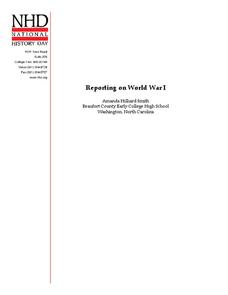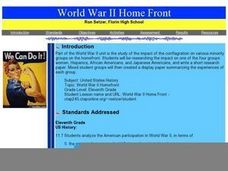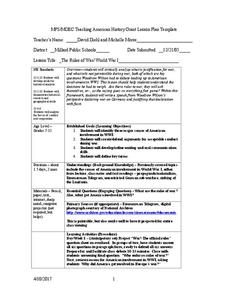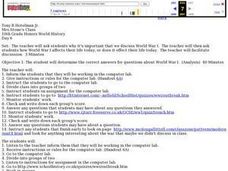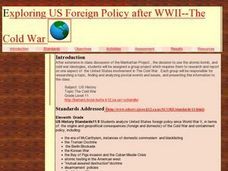National History Day
Why Did the United States Enter World War I in 1917?
World War I was the first major conflict on a global scale. Using primary documents, learners determine why the United States chose to enter World War I when it did. After analytical writing and group research, the causes of America's...
Curated OER
World War I
Eleventh graders investigate propaganda used during World War I. In this World War I lesson plan, 10th graders examine propaganda from the war and analyze war posters. Students then create their own propaganda posters on listed topics.
National History Day
Reporting on World War I
Throughout history, newspapers have reported the events of the day as they unfolded. Using primary and secondary sources from World War I, scholars uncover how the American people learned of the events of the War to End All Wars. History...
Poetry Society
War Horse and WWI Poetry
Here's a resource that deserves a place in your curriculum library. As part of their study of War Horse individuals create an anthology of World War I poetry.
Curated OER
World War II Home Front
Eleventh graders examine the political demands put on one of four groups living in America during WWII. Each class member is asked to research and write a paper describing the homefront experience for women, Hispanics, African-Americans,...
American Battle Monuments Commission
The Great War: A Visual History
Immerse yourself in the military operatives of the Great War with an interactive timeline and map. As high schoolers click on each year of World War I, they can select individual battles, campaigns, troop movements, and notable victories...
Curated OER
Leaders, Laborers, and Other Perspectives of World War II
How did the women in France feel about their country’s involvement in World War II? Class groups are assigned a country involved in WWII, and individuals within the group adopt the point of view of leaders, laborers, businessmen, women,...
Curated OER
World War I: War in a Democratic Society
Students research opposition and support for World War I from a number of perspectives. They analyze a number of primary and secondary sources, while considering what (if anything) makes a war just and write a letter expressing his/her...
Curated OER
The Rules of War/World War I
Young scholars explore the reasons the United States became involved in World War I. In this World History lesson, students research the reasons Woodrow Wilson made the decisions he did, prepare a debate and write a paper.
Curated OER
Evacuation: The Japanese Americans in World War II
Students examine Japanese internment camps of World War II. In this World War II lesson, students use primary and secondary sources to research the evacuation process and life within the internment camps. Students discuss the racial bias...
Curated OER
Prepping for a World War I Test
Review your WWI unit with this helpful resource. Young historians group up, complete a series of web-based activities, take a pop quiz, and examine the contents of a trunk considering items that would be most important during WWI. The...
Curated OER
Educating European Immigrant Children Before World War I
Discover the challenges in educating immigrant children at the turn of the 20th century. Reforms that New York City schools used are described here and data is included for your class to analyze, in its evaluation of the effectiveness of...
Curated OER
World War II and Propaganda Efforts
Students define propaganda and list the various propaganda techniques used to influence people. They identify propaganda methods used by the American Government to encourage Americans to support the war effort
Curated OER
To War Or Not To War?
Seventh graders research the political, societal, and economic factors of World War I, World War II, and the 2001 war against terrorism. They participate in class discussions, write journal entries, and conduct Internet research. ...
Curated OER
My Secret War: The WWII Diary of Madeline Beck: Lesson 11
Fifth graders explore world history by participating in a class game. In this propaganda lesson, 5th graders identify Madeline Beck and the role women played during World War II. Students create fictitious propaganda posters and...
Curated OER
The Consequences of World War II
Ninth graders explore the aftermath of World War II. In this World War II lesson, 9th graders investigate the consequences of the war as they complete a post-assessment project that requires them to compose essays on the topic.
Curated OER
End of World War II
Ninth graders examine the results of the Yalta Conference on Europe after the war. They develop a PowerPoint presentation that compare the effects of World War I and World War II. They write a journal entry taking the point of view of...
Curated OER
Dropping the Atomic Bomb: The Decision That Defined a Presidency
Students interpret historical evidence presented in primary and secondary resources. In this World War II lesson, students research the implications of the use of nuclear weapons to end the war in the Pacific. Students determine...
Curated OER
Perceptions of War
Tenth graders share perspectives on war with Iraq with students from various countries, and write position papers expressing specific stance on issues.
Curated OER
Exploring US Foreign Policy after WWII--The Cold War
Scholars explore U.S. Foreign Policy and Cold War ideologies adopted after WWII. They conduct Internet research on a topic or issue related to the Cold War Era, watch two films, and compose a time line and a multimedia presentation to...
Curated OER
Two World Wars
Students listen to a lecture about WWI, or they go through the WWI project time line in a computer center. Students repeat the above options about WWII. Once the research is complete, students compare the two wars by filling in the...
Curated OER
The Cause and Course of the Great War
Students interpret historical evidence presented in primary and secondary resources. In this World War I lesson, students research the causes of the war as well as the major events of the war. Students are...
Curated OER
Memories of War
Students consider how World War II impacted Europe. For this D-Day lesson, students visit selected websites to discover information about the invasion, its conditions, and the people who fought. Suggested activities are...
Franklin D. Roosevelt Presidential Library & Museum
Pearl Harbor Activity #6: December 7 and September 11 - Infamy Twins?
Why did attackers on December 7, 1941, and on September 11, 2001, choose the targets they did? That is one of several questions young historians try to answer as they compare and contrast the two attacks. They also consider the...


